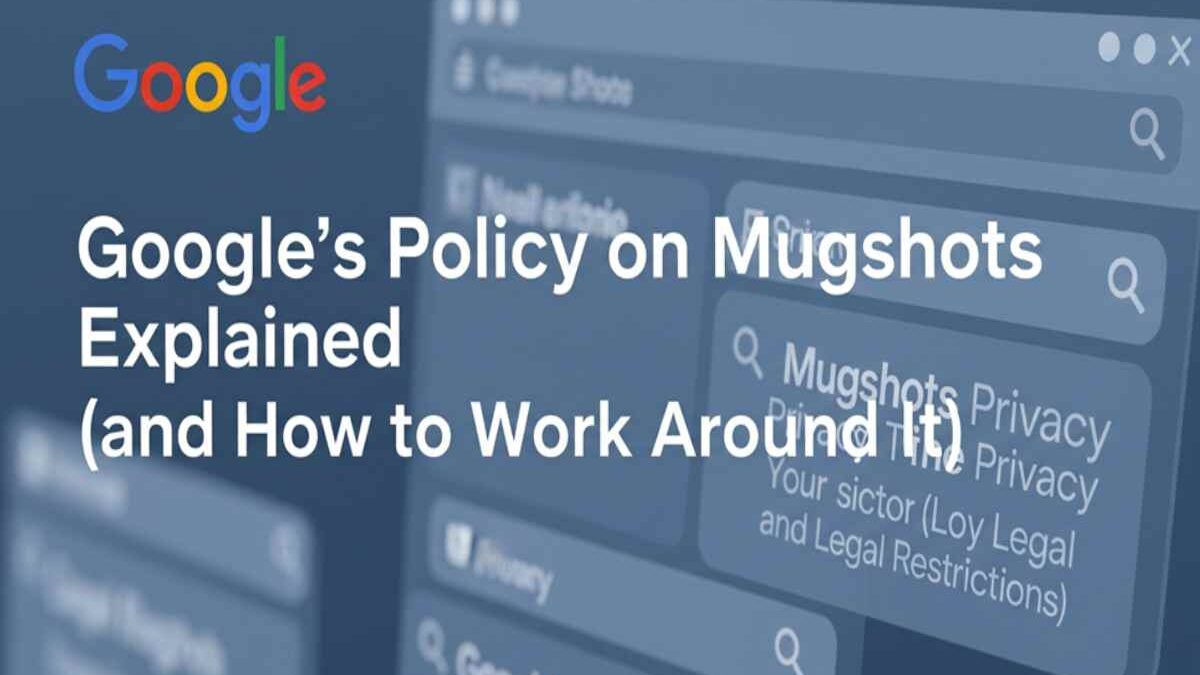A mugshot posted online can follow you for years, haunting search results, damaging job prospects, and undermining your reputation even after legal matters are resolved. And while Google doesn’t host these images, it plays a significant role in determining their visibility.
Understanding Google’s policy on mugshots—and what you can do about it—is critical if you’re trying to protect your online identity. This guide breaks down what the policy covers, what it doesn’t, and what options exist for removing or suppressing mugshots in search results.
Table of Contents
What Are Mugshots—and Why Does Google Have a Policy?
Mugshots are official photos taken by law enforcement at the time of an arrest. While they’re often considered public records, their online publication—especially when indexed by Google—can have long-term, outsized consequences for individuals who were never convicted or have moved on with their lives.
Why Google Got Involved
In 2013, Google changed its algorithm to reduce visibility for “mugshot websites”—sites that posted booking photos primarily to profit from removal fees. These sites were often exploitative, ranking high in search results and demanding hundreds (or thousands) of dollars for takedowns.
To curb this abuse, Google:
- Lowered the ranking of mugshot sites in search results
- Prevented them from using Google Ads
- Introduced limited removal pathways under certain circumstances
That said, mugshots can still appear on news sites, government portals, and forums, and they’re often difficult to remove entirely. Google’s policy does not guarantee removal, but it reflects an effort to minimize harm.
The Real-World Impact of Mugshots in Search Results
A visible mugshot can create serious problems, including:
- Difficulty securing employment or housing
- Reputation damage—even for dropped or dismissed charges
- Emotional distress, online harassment, and social stigma
And it’s not just individuals who are affected. Businesses (especially those in legal, finance, or healthcare fields) can suffer brand damage by association if a partner or executive is linked to an old mugshot.
Understanding Google’s policy is only the first step. The bigger question is: what can you do about it?
Can You Remove a Mugshot from Google?
The short answer: sometimes, but not always.
Direct Removal Isn’t Guaranteed
Google typically won’t remove mugshots just because they’re embarrassing or outdated. However, you might qualify for removal if:
- The image violates Google’s privacy policies
- The mugshot is part of non-consensual content, doxxing, or harassment.
- The site hosting the mugshot violates Google’s content guidelines
- You can present a court order mandating takedown.
What You Can Try
- Contact the website directly. Some sites will remove mugshots voluntarily, especially if charges were dropped or expunged.
- Submit a legal removal request. Google allows requests under its content removal policies.
- Pursue a court order. In some cases, you may need to work with an attorney to file for defamation or injunctive relief.
- Hire a reputation management firm. Professionals often use a combination of SEO, legal strategy, and negotiation to suppress or remove harmful content.
When You Can’t Remove It: How to Work Around It
If removal isn’t possible, your next best move is content suppression. This reputation management technique pushes the mugshot off the first page of Google by outranking it with positive or neutral content.
Strategies That Work
- Publish high-authority content: Create or optimize your website, LinkedIn profile, or business listings.
- Generate press coverage: Media mentions, interviews, and thought leadership can help crowd out old links.
- Start a blog or contribute guest posts: Own more branded search real estate.
- Encourage reviews: Genuine positive reviews on platforms like Google, Yelp, or Avvo (for professionals) boost trust.
- Use SEO smartly: Optimize your name and business across assets to control the narrative.
Be Patient and Consistent
It may take weeks or months, but Google’s algorithm rewards consistent, relevant, and high-authority content. With time, your positive results can outrank the negative ones, especially if those mugshots appear on lower-quality domains.
Legal Considerations
If your mugshot is linked to false accusations, outdated charges, or a clear intent to defame, legal action may be an option.
- Defamation claims: If the content includes false or misleading information, you may have a case.
- Expungement: If your record has been sealed or expunged, you may be able to use that documentation to request removals.
- Right to be forgotten: While not guaranteed under U.S. law, this principle is sometimes used as a framework in takedown negotiations.
Always consult with an attorney or a reputable firm that understands both the legal and technical sides of the process.
Final Thought: Control What You Can
Google’s mugshot policy reflects a tricky balancing act between public information and personal dignity. While the search engine has made strides in limiting exploitation, the burden of cleaning up your image still falls on you.
But you don’t have to do it alone. Whether it’s filing a takedown, suppressing harmful content, or building a stronger digital presence, there are steps you can take to regain control of your search results—and your reputation.

